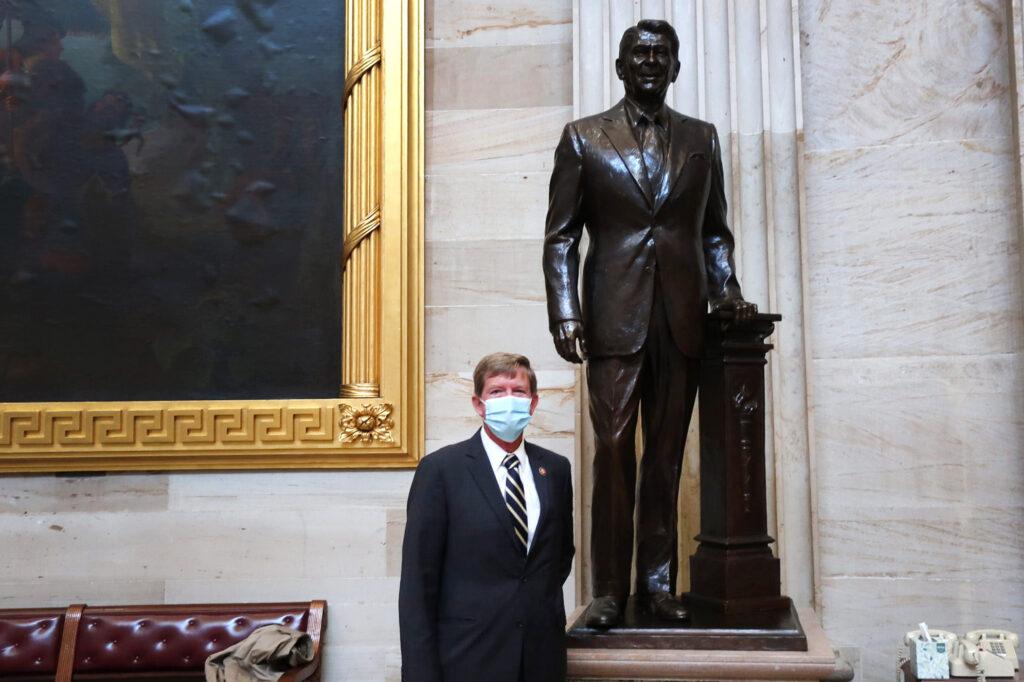
During non-pandemic times, the U.S. Capitol Rotunda is crowded with tour groups. But it was empty on a recent Thursday afternoon as GOP Rep. Scott Tipton walked through, just the click of his cowboy boots echoing off the marble.
We met there because, that very day, the last of his things had been moved out of the office he had occupied for the past 10 years.
“It's always kinda bittersweet,” Tipton said of leaving the Capitol.
In June, he lost to primary challenger Lauren Boebert, ending his hopes for a sixth term in Congress. Since then, he’s had a lot of time to reflect. He said he always knew his time here was limited.
“As soon as you walk in the door, you're moving toward leaving.”
There’s a saying about members of Congress: There are two types — and, no, it is not Democrat and Republican. It’s the show horse and the workhorse. For the last 10 years, Tipton has been viewed by many in Congress as the latter.
Tipton came into office in the 2010 Republican wave, unseating Democratic Rep. John Salazar. Before running, Tipton had spent more than a decade involved in Republican politics in southwestern Colorado and represented the area in the state House for two years. The other Colorado freshman who joined Congress that year was fellow Republican Cory Gardner; voters chose to send him back home at the end of the year, too.
When it comes to politics, Tipton’s role model is standing in statue form on the other side of the Rotunda — President Ronald Regan.
“[Reagan] said, 60, 70, 80 percent, if he can get that, he would take it and work on the balance. And I think that's a sensible approach,” he said.
That philosophy helped Tipton get several bills signed into law over the years, like the Hermosa Creek Watershed Protection Act, that he worked on with Democratic Sen. Michael Bennet, or the MOBILE Act, which enables expanded mobile banking by allowing financial institutions to verify customer’s ID and prevent fraud.
Even as he reflected on his bipartisan record in Congress, Tipton noted there's always going to be partisanship here — and he said he doesn’t mean that in a negative sense; it’s just where people come from.
But he said things have shifted in Congress over the past decade. He uses the issue he’s most passionate about — water rights — to explain. He’s been trying to get a water rights protection bill passed during his time in office. In his early years it drew bipartisan support. But more recently, even though the bill language hasn’t changed, Democrats have stopped agreeing to sign on.
“I think some of the partisanship has reached a very high level,” he said, “but, you know, we see this frankly reflected in the country."
Everyone here has their own political stripe. The trick, Tipton believes, is finding common ground. “Hold true to your principles, but understand you've got 434 other members that maybe have a different view in terms of what ought to be accomplished. And you've gotta be able to reach out to them and to help educate them, as they can educate you.”
It’s this kind of approach that his colleagues liked, according to GOP Rep. David McKinley of West Virginia. The two are friends who would often sit together on the floor. In a building full of people attracted to the limelight, he said Tipton isn’t a bomb thrower.

“He's a genuine person that doesn't seek the headlines, but effectively gets things done. He was getting things done for Colorado,” said McKinley.
That doesn’t mean Tipton doesn’t speak up or get animated. McKinley recalls how angry Tipton was over the 2015 Gold King Mine wastewater spill, which turned the waters of the Animas river through Durango bright orange-yellow.
And Tipton has occasionally made news for unintentional reasons. The two nearly caused an international incident during a congressional trip to Israel, when they were questioned by a guard from the Wakf Islamic trust, which controls the site, after they picked up an olive branch on the Temple Mount, something that could have violated the intricate rules that govern the holy site.
“Colorado, the third district, lost a very effective congressman,” McKinley said. “And I'm gonna miss him. I think Congress is gonna miss him.”
Members of Colorado’s congressional delegation expressed similar sentiments.
“We obviously disagreed on politics and policy, but, uh, we've always had a very good relationship,” said Democratic Rep. Jason Crow, who described Tipton as easy to work with.
Republican Rep. Doug Lamborn added he was in awe of how much time Tipton spent traveling to all corners of the vast third congressional district.
“When he wasn’t in Washington, he was on the road and hardly even got back to his home. And I always remember being impressed with how he was constantly reaching out to all the people of the district.”
Tipton acknowledges it was a challenge to represent a district with the size, scope and diversity of the third, which covers almost half the state. And he heard about that a lot.
You'd have people that [would say] ‘Hey, you're doing the right thing,’ ‘You aren't doing it quite well enough,’ or ‘You don't represent me.’ And you carry the messages and try to be able to find the balance as best you can,” Tipton explained.
The other thing he learned on Capitol Hill is patience. Tipton came here from the Colorado State legislature where bills are required to get at least one hearing and a committee vote. That’s not always the case in Congress. Few bills really move through the process as intended. That leaves him with regrets that have nothing to do with getting more time in front of the cameras or tweeting more.
“I guess the biggest regret is what you'd label as some of your unfinished work, you know, that you would have loved to have seen actually put into law because that's what you're here to do,” he said. His water rights bill is one example. Another is a bipartisan bill he worked on with Gardner, Crow and others to reform hiring practices at the Veterans Administration.
Still, he is satisfied with his tenure, pointing out there have been congress members here longer than him who have never had a bill signed into law. Tipton introduced his final bill last month — it would increase transparency in text-based fundraising by requiring political committees to fully identify themselves in their messages. He knows it won’t pass, but he wanted to lay down a marker in the hope that someone else might pick it up.
Tipton said it’s been a privilege to be able to represent the third district for the past 10 years. Former Colorado Representatives have continued to serve in more local capacities — as county commissioner, mayor, even as governor. For the time being, though, Tipton said he’s going to enjoy being home in Cortez and spending time with family, doing all the things he missed this past decade.
As for missing Washington, well, Tipton points to something former Michigan Rep. Dan Benishek told him.
“[He said], ‘I'll miss the clowns, but not the circus.’ And I thought, you know, I may use that one day. I guess I just did,” he said laughing.
Tipton leaves Congress with a legacy of bills he’s proud to have passed for his district, as well as some more tangible mementos: his congressional cowboy boots, his congressional pin, and the wisdom an incumbent representative wrote in a memo for Tipton’s freshman congressional class: “Once a member, always a member.”
Editor's Note: Due to an editing error, an earlier version of this story had the wrong first name for Rep. Salazar. His first name is John, not Joe.







